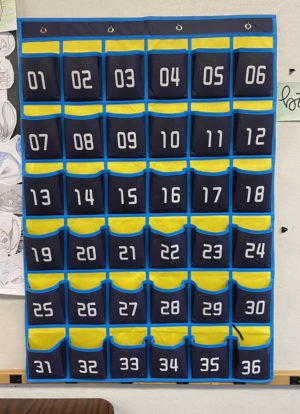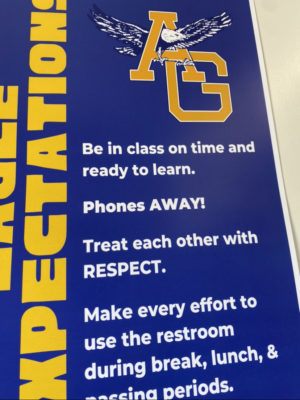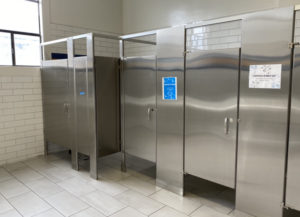New school policies on cell phones, tardies, bathroom usage
Over Winter Break, teachers and administration at Arroyo Grande High School (AGHS) devised new policies, to help tackle the most prevalent issues found on campus. There were three main rules created, which involve cell phones, bathroom breaks, and tardies. Many students across the AGHS campus have differing views on these new combative measures.

The first, and arguably most discussed change is decreasing phone usage. Students are now required (unless told otherwise by a teacher) to have their cell phones off and away during class. Some teachers have students put their phones in calculator pouches. This provides no risk of students using their phones but can be problematic for other reasons.
Teresa (‘25), a freshman at AGHS believes that the phone policies can be a bit less harsh. “I understand it for the most part,” she said, “but in some classes, you have to use your phone. I took an art class, we used our phones for inspiration, and listened to music… they should do it 50/50, half the classes you can have your phone, and half the classes they’re away.”
Another student, Isabelle Bowdy (‘23) has a slightly differing opinion. “Honestly I kind of like the cell phone policy, it keeps me on task,” she said. “But I think we should be allowed exceptions during free time.”
The hope is that limiting access to phones, especially for this generation, will help students practice restraint against the temptation of screens in the learning environment and decrease distractions.
In addition to this, administration is now overseeing consequences when it comes to tardiness.
Some students feel that these consequences may be too severe.

“The tardy policy should be more understanding of kids being late to first period,” Bowdy said. “But the sweeps in between classes make sense.”
Alondra Alvarado (‘23) doesn’t agree with the school cracking down on tardiness as she feels students will face the consequences in their own lives and don’t need to hear them from the school.
“I actually think the tardy thing is dumb,” she said. “Personally, I think if a student is going to be late anyway, consistently that is, that’s their own responsibility if they don’t want to pass their classes.”
While it is known that showing up to class on time is the first stepping stone to success in a class, students note that it is important that administrators take into consideration why a respective student was tardy on a certain day.
The last new school policy that was implemented was restricted bathroom usage. In an attempt to control the property damage and invasion of privacy due to students taking pictures of other students in the bathrooms, students now must leave their phones in the classroom or by the teacher’s desk, as well as sign out and bring a bathroom pass. Only one student may go at a time, except of course in the case of an emergency.
Elise Allen (‘23) has conflicted feelings. “The bathrooms I kind of understand, at least they let us go,” they said. “But I think it’s kind of dumb for them to restrict our bathroom use, I think it’s weird.”

“I think the crackdown on [phones and bathroom use] is good because it’ll limit the bathroom vandalization,” Kelly Diaz (‘23) said.
Bowdy feels that enforcing new policies isn’t the best way to prevent the root of the problem.
“The real problem isn’t kids hiding in the bathroom, it’s kids bringing their vape to school,” Bowdy said.
Despite conflicting opinions from students, administrators hope these new policies will prove helpful in the long run.
“The cell phone, bathroom, and tardy policies are all designed to help create a better learning environment for students,” Alyssa LaBrado, a counselor at AGHS said. “Administration created the new policies in order to support a more engaging learning environment and a safer campus.”

Grace LeVeque is a senior at Arroyo Grande High School, and she's ready for her second year in Newspaper. She loves listening to music, reading books,...





